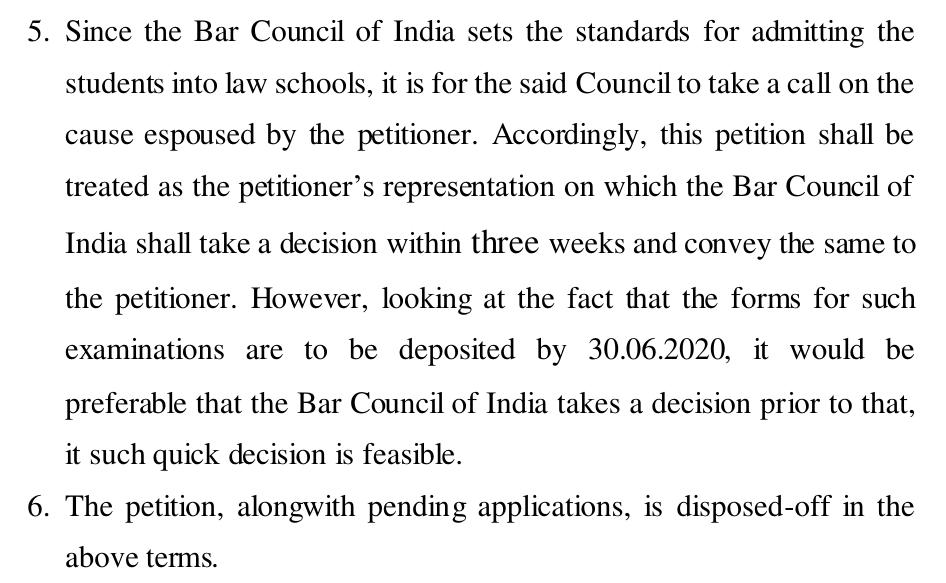
The Delhi high court (HC) has ordered the Bar Council of India (BCI) to consider a petition to hold the Common Law Admission Test (CLAT) in local languages, as reported by LiveLaw and others.
According to the order (via LiveLaw), the petition was seeking from the HC directions to the CLAT convenors “for conducting the CLAT 2020 Examination” and “all other future CLAT examinations... in the local languages”.
The HC declined to do so but threw the hot potato to the Bar Council of India (BCI), which the court said was responsible for admissions standards to law schools.
The BCI should make a decision on this within three weeks, or ideally earlier since the CLAT application deadline was 30 June, said Justice Najmi Waziri (see picture above).
The case against English
The case for holding the CLAT in languages other than English is not new and rears its head every so often.
This year’s CLAT pattern changes towards a more “comprehension based” exam, was criticised in a column as potentially exacerbating the divide between the privileged few who speak English as their first or second language, and others.
And in 2014, the CLAT, which was presided over by RMLNLU Lucknow that year, had considered whether all CLAT questions should also be translated into Hindi.
That, of course, never ended up happening.
The case for English
The arguments against scrapping English as the sole medium of examination are considerable. The Supreme Court generally only conducts its proceedings in English, as do many high courts.
And, as one CLAT trainer had pointed out, English remains the “career language” of many lawyers in India, especially at the top end.
Holding the CLAT in multiple languages besides English, particularly without national law schools offering across-the-board tuition in those languages, risks creating several parallel legal education streams, with students in the non-English stream potentially facing a harder time later on to operate in the entire Indian legal system, from lower courts in local languages to the higher instance benches.
If a non-English CLAT were to happen, it would also necessitate a wholesale overhaul of legal education and potentially even the current courts system.
CLAT may currently have other fish to fry
The CLAT 2020, like pretty much all of public life, has struggled to adjust to the Covid-19 landscape with three postponements to date.
That is in addition to the whammy of the cancellation of the Central Board of Secondary Education (CBSE) class 10 and 12 board exams, which the board told the Supreme Court today.
It’s therefore not at all certain that the CLAT may even be held between 1 and 21 July at all (with a date to be announced some time before 1 July); we understand that the CLAT committee is currently in the process of deciding on next steps on this front.
Amongst candidates and parents, confusion reigns right now.
One anonymous message we received, noted: “The Covid-19 pandemic has caused a stand-still in our lives and especially those of students who are appearing for competitive entrance exams. There is a certain uncertainty about the date of the Clat exam and the best solution to this would be to consider the 12th board marks while admitting students into law universities.”
Another added: “Thousands of students and parents are very anxious but being ignored. On top of that Delhi HC has yesterday sent notice to BCI asking that CLAT be conducted in Hindi. What is this?”
In other words, while holding the exam has never been easy or without any hiccups, the CLAT 2020 has much bigger challenges to overcome this year than most.
If the exam, planning for which has been going on for almost a year, were to be held in other languages, the translation issues alone, including ensuring parity, fairness and standards across all languages, would be a huge additional challenge to organise, an academic with knowledge of the process told us.
We understand that the CLAT committee has not been served with any notice or request for comments from the high court or BCI in this respect.
In light of the above, as well as the general controversy and lack of consensus around a non-English CLAT, it seems highly unlikely that (even) the BCI would throw the process into further chaos with an edict to conduct this year’s CLAT in other languages, especially at such short notice and during such unprecedented times.
And even if the BCI did pass an order, odds are the CLAT convenors would not implement it without at least another high court challenge of such order.
That is not to say a non-English CLAT may never happen.
But right now a much bigger question mark surrounds whether the 2020 CLAT will even happen in July and whether the CLAT may even be forced to go online in some way, which is a discussion we understand is currently taking place amongst the CLAT convenors.
threads most popular
thread most upvoted
comment newest
first oldest
first
Even those who did (will do) their 10+2 in regional languages and have been preparing for CLAT in English, will also not like a sudden switch to regional language.
threads most popular
thread most upvoted
comment newest
first oldest
first